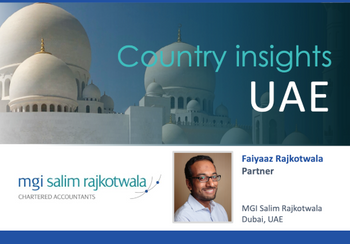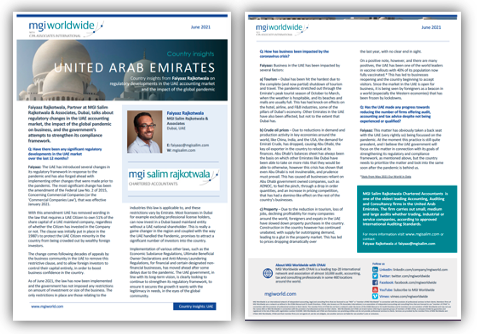Faiyaaz Rajkotwala of MGI Salim Rajkotwala & Associates talks about the impact of Covid-19 and recent regulatory developments in the UAE

In this Country Insight from United Arab Emirates, Faiyaaz Rajkotwala, Partner at MGI Salim Rajkotwala & Associates, Dubai, shares his thoughts about regulatory developments in the UAE accounting market, the impact of the global pandemic on business in the region, and the government’s attempts to strengthen its compliance framework.
Q: Have there been any significant regulatory developments in the UAE market over the last 12 months?
Faiyaaz: The UAE has introduced several changes in its regulatory framework in response to the pandemic and has also forged ahead with implementing other changes that were made prior to the pandemic. The most significant change has been the amendment of the Federal Law No. 2 of 2015, Concerning Commercial Companies (or the ‘Commercial Companies Law’), that was effective January 2021.
With this amendment UAE has removed wording in the law that requires a UAE Citizen to own 51% of the share capital of a UAE mainland company, regardless of whether the Citizen has invested in the Company or not. The clause was initially put in place in the 1980’s to protect the UAE Citizen minority in the country from being crowded out by wealthy foreign investors.
The change comes following decades of appeals by the business community in the UAE to remove this restrictive clause, and to allow foreign investors to control their capital entirely, in order to boost business confidence in the country.

As of June 2021, the law has now been implemented and the government has not imposed any restrictions on amount of investment or size of the business. The only restrictions in place are those relating to the industries this law is applicable to, and these restrictions vary by Emirate. Most licensees in Dubai for example excluding professional license holders, can now invest in a Dubai based mainland entity without a UAE national shareholder. This is really a game changer in the region and coupled with the way the UAE handled the Pandemic, promises to attract a significant number of investors into the country.
Implementation of various other laws, such as the Economic Substance Regulations, Ultimate Beneficial Owner Declarations and Anti-Money Laundering Regulations, for financial and certain designated non-financial businesses, has moved ahead after some delays due to the pandemic. The UAE government, in line with its long-term vision, is clearly looking to continue to strengthen its regulatory framework, to ensure it secures the growth it wants with the legitimacy in needs, in the eyes of the global community.
Q: How has business been impacted by the coronavirus crisis?
Faiyaaz: Business in the UAE has been impacted by several factors:
a) Tourism – Dubai has been hit the hardest due to the complete (and now partial) shutdown of tourism and travel. The pandemic stretched out through the Emirate’s peak tourist season of October to March, when the weather is hospitable, and its beaches and malls are usually full. This has had knock-on effects on the hotel, airline, and F&B industries, some of the pillars of Dubai’s economy. Other Emirates in the UAE have also been affected, but not to the extent that Dubai has.
b) Crude oil prices – Due to reductions in demand and production activity in key economies around the world, like China, India, and the USA, the demand for Emirati Crude, has dropped, causing Abu Dhabi, the key oil exporter in the country to relook at its finances. Abu Dhabi’s balances sheet has always been the basis on which other Emirates like Dubai have been able to take on more risks that they would be able to otherwise, however this crisis has shown that even Abu Dhabi is not invulnerable, and prudence must prevail. This has caused all businesses reliant on Abu Dhabi government owned companies, such as ADNOC, to feel the pinch, through a drop in order quantities, and an increase in pricing competition, that has had a domino-like effect on the rest of the country’s businesses.
c) Property – Due to the reduction in tourism, loss of jobs, declining profitability for many companies around the world, foreigners and expats in the UAE have slowed down property purchases in the country. Construction in the country however has continued unabated, with supply far outstripping demand, leading to a glut in the property market. This has led to prices dropping dramatically over the last year, with no clear end in sight.
On a positive note, however, and there are many positives, the UAE has been one of the world leaders in vaccine rollouts with 50% of its population now fully vaccinated.* This has led to businesses reopening and the country beginning to accept visitors. Since the market in the UAE is open for business, it is being seen by foreigners as a beacon in a world (especially the Western economies) that has been frozen by lockdowns.
Q: Has the UAE made any progress towards reducing the number of firms offering audit, accounting and tax advice despite not being experienced or qualified?
Faiyaaz: This matter has obviously taken a back seat with the UAE (very rightly so) being focussed on the pandemic. At the moment this practice is still quite prevalent, and I believe the UAE government will focus on the matter in connection with its goals of strengthening its regulatory and compliance framework, as mentioned above, but the country needs to prioritise the matter and look into the same soon after the pandemic is behind us.
*Stats from May 2021 Our World in Data
Click HERE to view the full Country Insight

For more information contact Faiyaaz at [email protected] or visit the firm profile page or website
MGI Worldwide with CPAAI, is a top 20 ranked global accounting network and association with almost 10,000 professionals, accountants and tax experts in some 460 locations in over 100 countries around the world.
